- Home
- Francine Mathews
Death of a Wharf Rat
Death of a Wharf Rat Read online
Books by the Author
The Merry Folger Nantucket Mystery Series
Death in the Off-Season
Death in Rough Water
Death in a Mood Indigo
Death in a Cold Hard Light
Written Under the Name
Stephanie Barron
Being a Jane Austen Mystery Series
Jane and the Unpleasantness at Scargrave Manor
Jane and the Man of the Cloth
Jane and the Wandering Eye
Jane and the Genius of the Place
Jane and the Stillroom Maid
Jane and the Prisoner of Wool House
Jane and the Ghosts of Netley
Jane and His Lordship’s Legacy
Jane and the Barque of Frailty
Jane and the Madness of Lord Byron
Jane and the Canterbury Tale
Jane and the Twelve Days of Christmas
Jane and the Waterloo Map
Copyright © 2017 by Francine Mathews
All rights reserved.
Published by
Soho Press, Inc.
853 Broadway
New York, NY 10003
Library of Congress Cataloging-in-Publication Data
Mathews, Francine.
Death on Nantucket / Francine Mathews.
A Merry Folger Nantucket mystery ; 5
ISBN 978-1-61695-737-7
eISBN 978-1-61695-738-4
1. Folger, Merry (Fictitious character)—Fiction. 2. Nantucket
Island (Mass.)—Fiction. 3. Murder—Investigation—Fiction.
4. Women detectives—Fiction. I. Title.
PS3563.A8357 D44 2017 813’.54—dc23
2016047184
Printed in the United States of America
10 9 8 7 6 5 4 3 2 1
To Mark,
for all the memories of small boys and sand
Prologue
The shadow of the Cessna flitted over the white-capped waves of Nantucket Sound, swift and elusive as a gull’s wing. Nora could see the shape of the island long before it spread beneath them, dark green and brown in the surrounding blue. She was sitting near the front of the Cape Air plane, which was the size of a minivan. Its passengers were usually distributed among its nine seats by weight, but on this sunny May morning there were only three people flying to Nantucket. The pilot told them they could sit where they liked. Nora chose the starboard wing. She was hoping to glimpse the house’s gray-shingled eaves as they flew over the harbor.
There was the jetty, trailing out into the Sound like a pinball flipper. There, far below, was the car ferry from Hyannis steaming into its wharf. No sails braved the stiff wind that raked the sea today, and the moorings in the basin were deserted. Summer People and their yachts had yet to arrive. But the steeples of the old churches on Centre and Orange Streets still pierced the horizon in a way she remembered.
When she craned to study the roofs above Steps Beach, however, Nora was suddenly disoriented. There were so many houses, now, where once there had been only a few. Raw scars in the bluff and naked wood frames showed that more were rising. Huge houses with swimming pools—swimming pools, on Nantucket!—stretched out behind them. Compounds with guest cottages and caretaker quarters above expansive garages. What did people do with so much space? Although Step Above, the house where she’d spent each summer as a child, was hardly small . . .
The plane dipped and bucked as the pilot descended. The harbor fell away behind. Nora gripped the seat, her stomach lurching into her throat as the ground came up to meet them. No matter how many bush planes or choppers she caught, in hellholes or paradises around the world, this was what she remembered each time she landed: a runway bracketed by beach plum and sand.
“You in for the Wine Festival?” her taxi driver asked.
“The what?”
“Wine Festival. Whole world’s coming in this weekend. It’s the summer kickoff.”
“Not Memorial Day?”
“Too obvious.” His eyes met hers in the rearview mirror. An embroidered flourish on his polo shirt read Kevin. This was Kevin’s Island Taxi, so apparently she’d scored the owner himself. A tribute to Tuesday mornings, off-season.
“The Chamber of Commerce likes to make up reasons to celebrate,” he explained.
“Like Daffodil Weekend. Or Christmas Stroll,” Nora said.
“And the Book Festival, the Dance Festival, the Film Festival.” Kevin shrugged. “Now it’s wine. I’m waiting for them to organize Oktoberfest, myself, but knowing the Chamber it’ll probably be Craft Brews, and I can’t get behind that. Why pay six bucks a bottle when you like your beer on tap?”
The taxi bucketed over Main Street’s cobblestones. Nora glanced swiftly right and left, taking it all in. Scaffolding surrounded the aged brick of the Pacific Club at the foot of the street, and Ralph Lauren had taken over the space that used to belong to Nantucket Looms, but the compass rose painted on the side of the building still showed the nautical miles to Pitcairn Island—14,300. Crazy Quinn’s ice cream store was gone, she realized, as they lurched across the cobblestones to Water Street. How long had she been away?
“Lincoln Circle,” Kevin mused as he turned up Cobblestone Hill. “Spence Murphy lives around there. The foreign correspondent. Probably before your time, and he’s getting pretty old, now—but that guy will always be a personal hero to me. Staying behind after we pulled out of Laos. He blew the whole secret war wide open, you know? The FBI had a file on him, he was considered so dangerous.”
“They had files on a lot of people, back then,” Nora replied.
“What’s the address you’re looking for?”
“Thirty-two Lincoln. Place called Step Above.”
Kevin glanced at her again in the rearview mirror. “But that’s Murphy’s place, isn’t it? You know him?”
Nora felt her usual weariness. Here on Nantucket she shouldn’t have to explain. “He’s my dad, actually.”
“Your dad?” Kevin’s eyes widened. He was trying to make sense of it: her delicate frame, jet-black hair, her almond-shaped eyes. She had never looked like a Murphy and never would.
“I’m adopted.”
He almost missed the granite stone marker at the foot of the crushed quahog shell drive. She’d heard the house had been winterized when her parents moved permanently on-island, but the hedges hadn’t been trimmed in years. The sprawling old captain’s house needed re-shingling and the rosa rugosa had run amok next to the garage.
Some things, she thought with a rush of gratitude as she handed Kevin his fare and stepped out of the taxi, never changed at all. Some things you could count on. Some things were safe.
That was why, despite all the heartache and hatred, she had finally decided to come home.
Kevin waved and pulled out of the circular drive. Nora shouldered her backpack. It held all she owned in the world. She lifted her head and took the tricky first step toward the front door.
Chapter One
“It’s absolutely perfect,” Meredith Folger said as she gazed at herself in the full-length mirror. She was standing in the sunlit master bedroom of an old house built in 1821 by a man named Thomas Mason, who had captained the Leah out of Nantucket until his death in the South Pacific in 1843. The house on Cliff Road, faced with narrow white clapboards and topped with a square walk on its roof, was lapped in green lawns and hedges and buffered by opulent hydrangeas. It had come down through the centuries in the Mason family, who used it only during the summer months now. From the windows that drenched the room i
n sunshine, Merry could look out over the back terrace and its pergola to the wet-paint smear of the harbor, which was flooded with boat traffic on this first day of July. The expanse of Jetties Beach was clearly visible. Happy people were stretched out on its sand and kites rippled over its dunes. But Merry wasn’t admiring the million-dollar view. She had eyes only for herself, and the extraordinary gown Mayling Stern had just slipped carefully over her blonde head.
It was pale silk chiffon of a shade somewhere between cream and chartreuse that brought out the vivid green of her eyes. Mayling had cut a curvaceous column with a classically elegant bodice that framed Merry’s collarbone like a Renaissance portrait. The back plunged in a low V. The hem stopped just above the ankle strap of her shoe. It was a grown-up wedding dress for a woman past thirty who had no interest in presenting herself as the heroine of a Disney fairy tale. Over the past few months, Meredith had seen every bridal salon in Boston, high-priced and low, and despaired of finding anything that was not billowing or farcical. The fashion appeared to favor voluminous skirts and jeweled bodices. She refused to speak her vows to Peter Mason across three feet of pendulous hoop, like Scarlett O’Hara, as she’d told Mayling bitterly one night over dinner at Dune.
“Here’s what you want,” the designer said coolly, as she sketched red lipstick swiftly over her white napkin. “Severe. Yet timeless. Like the walls of this room.”
It was a composition of maybe five lines. A dress not for a bride, Merry thought, but a dress to get married in. She met Mayling’s eyes. “Are you serious?”
“Of course. I’ve always wanted to do bridal.”
“What would it . . .” She swallowed, not sure how to ask the price of a New York designer’s bridal fling. Fifteen thousand dollars? Twenty? “I mean, would this be couture level?”
“In terms of cost?” Mayling’s eyes slid over to Peter, whose hand cupped Meredith’s shoulder. “I thought you were marrying money. But never mind. For a friend—a friend I’m experimenting on . . . such a deal, as my father, Maury, used to say. I’ll throw in the fabric at cost, as a wedding gift.”
Merry took the napkin home. She taped it to a whiteboard above her police station desk, where it hovered in her peripheral vision as she scrolled through databases. In April, she had her first fitting in Mayling’s muslin model—something she hadn’t expected and was unable to assess.
But here, in the graceful light of the old and beloved house, she saw the actual gown for the first time.
On herself.
And she was exquisite.
Elegant. Confident.
Unrecognizable?
“Hold still,” Mayling said through a mouthful of pins. She pinched a miniscule amount of silk at an almost-invisible seam. Merry tried not to breathe.
A woman’s laughter drifted up from the center hallway—Georgiana Whitney, Peter’s sister, who was staying in the house for the next month. Then Peter’s voice, the words indistinguishable.
“Don’t let him in,” Merry said tensely.
Mayling lifted her head. “That bad?”
The designer had brought the dress to Cliff Road because Merry was stealing time for the fitting from one of her busiest weeks. It was Friday, July 1st, the day before Nantucket would launch its annual Fourth of July weekend celebrations. That meant road races tomorrow—Peter was competing in one—fireworks off Jetties Beach the night of July 3rd, and Main Street morning activities (complete with water fights between rival firemen crews, pie-eating contests, and crying babies) on the Fourth.
The acknowledged nightmare of the entire weekend, however, was a spontaneous event the Town Council hadn’t sanctioned or funded, or could possibly control—the Nobadeer Beach Party. This was a recent phenomenon that had grown over the years through social media. Thousands upon thousands of high school and college kids poured off the ferries with cases of beer or drove over the sand in permitted vehicles and took over Nobadeer Beach on Nantucket’s South Shore. They arrived early in the day and stayed until the police shut them down. This was usually around dinnertime, at which point many of the kids were passed out from alcohol poisoning or drug overdoses or too many selfies in the sun. Ambulances carried the casualties to Nantucket Cottage Hospital, which was invariably overwhelmed. Partiers peed on local residents’ lawns, trashed their patio umbrellas and cars, left enormous piles of garbage on the beach, and—memorably—invaded empty houses to have sex on strangers’ couches. Merry and her fellow police officers were expected to contain and control the hordes, but when they tried to discourage more cars or people from walking onto Nobadeer, the spontaneous bash simply moved to a different beach elsewhere on the island. It was a significant headache because it strained the Nantucket police during a weekend when they were already challenged by the crowds on Main Street. They were forced to bring in extra Community Service Officers and police by the dozens from the mainland.
But that all began tomorrow. Today, Merry had agreed to meet George and Peter at the Cliff Road house before all Independence Day hell broke loose. Mayling arrived half an hour early. Merry thought that would give her enough time to fit the dress. But now she didn’t want to take it off. And she didn’t want Peter to see it before The Day.
She groped for Mayling’s hands, her smile incandescent, her eyes blurring with tears. “Lock the door.”
“You’re welcome,” Mayling said.
The unconventional gown changed everything about a wedding Meredith had secretly been dreading.
It gave her courage to defy Peter’s formidable mother, who lived permanently on Park Avenue, and veto a New York ceremony. It allowed her to blithely decline a reception at the Pierre. Merry and Peter would be married in the soaring clarity of the old Congregational church on Centre Street, and walk up to the Cliff Road house afterward, followed by their friends. Tess Starbuck would cater the food, which would be fresh and locally sourced and utterly delectable. Mayling’s husband, Sky Jackson, had ordered cases of wine and champagne from the vineyard owners who’d impressed him most during the Wine Festival in May.
“You should carry arum lilies,” Mayling said now, eyeing her critically. “The cream ones, with chartreuse throats. Perfect with this silk. The little girls can have late hydrangeas.”
“—In Ralph’s lightship baskets,” Merry supplied. Ralph Waldo Folger was her grandfather. The little girls were Georgiana’s daughters. They would get to miss a day of school, at least, to fly in from Connecticut for the September wedding. Their two brothers were equally happy to cut class for Uncle Peter.
“Meredith!” Peter called.
“Coming!”
She helped Mayling tuck her wedding gown back into its protective silk bag, her fingers lingering on the zipper.
“We’ll do one last session a week out from the date,” Mayling warned, “in case you’ve somehow lost or gained weight dramatically in the interim. But tell me right now if there’s anything about the dress you can’t live with.”
“Just the months until September,” Merry said.
Mayling smiled fleetingly. She was not the most expressive of women, but Merry had learned that she cared deeply about the few people she allowed into her life. “Those weeks will fly, girlfriend. And you’ve got so much to do between now and then. Not to mention work.”
“Work.” Merry glanced at her phone. “Damn. I’ve got a meeting at the station in half an hour. And Peter downstairs.”
“Go,” Mayling said, and unlocked the bedroom door.
Georgiana and her brother were sprawled on the twin white sofas that flanked the old fireplace. The chairs surrounding them were covered in varying shades of green and blue linen, some faded by sun, and the aqueous light filtering through the windows gave the entire space a floating quality. Down-filled pillows with old needlepoint covers were scattered among the seat cushions and tossed on the floor, probably by George’s kids or their exuberant Labrador. Nothing
was too precious to touch or scuff or treat carelessly in this place, despite the excellent provenance of the tables dotting the room or the nineteenth-century oils on its walls. For nearly two centuries it had been a family house, worn and loved. Merry was comfortable here as she never quite was in the Mason homes on the mainland.
“We were talking about the tent,” George said as Merry crossed the hall and sank down beside Peter.
His hand came around her shoulders. “George wants one.”
“Because of rain.”
“Of course,” George said patiently. “September’s usually fine, but who knows? We could get a hurricane.”
“In which case, we’ll gather in here around the fireplace,” Merry suggested.
“It’ll be pretty crowded.”
“Fifty people?” This was the intimate number of guests Merry and Peter had negotiated. None of his extended family’s friends. Just people they both knew and loved. “This room could hold twice that. They’ll spill into the hall.”
“And the dining room,” Peter pointed out.
“Where do you put the dance floor?” George asked reasonably. “And the band?”
“The what?” Peter’s look of dismay was priceless. “Can’t we just have a jazz trio for background noise over the champagne and hors d’oeuvres?”
“You’re not going to dance with your bride?”
He glanced at Merry. “Does the bride want me to?”
“The bride thinks it’s a shame,” Merry replied, “to crowd the back lawn and block this spectacular harbor view with an enormous white elephant that costs around ten thousand dollars to erect and dismantle.”
His dark brows flew up. “Are you serious?”
“I am.”
“Good God. Merry’s right, George—we’ll huddle around the fire if it rains.”
“Suit yourself.” George kept her eyes on a notepad list she was compiling. “Just remember you have about a week to change your mind. After that, late fees apply.”

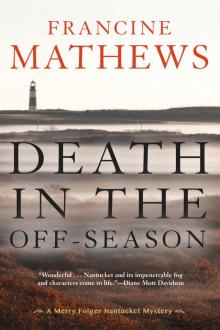 Death in the Off-Season
Death in the Off-Season Death in Rough Water
Death in Rough Water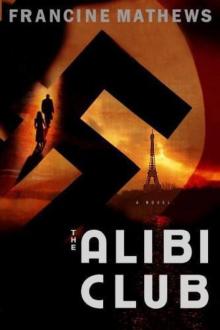 The Alibi Club
The Alibi Club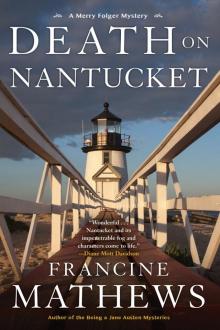 Death of a Wharf Rat
Death of a Wharf Rat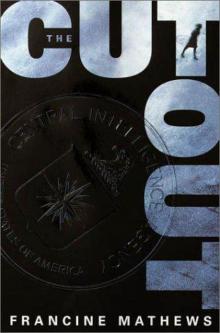 The Cutout
The Cutout The Secret Agent
The Secret Agent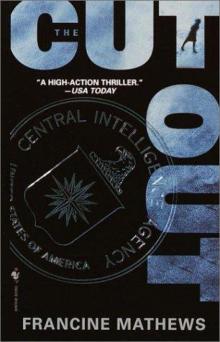 The Cutout cc-1
The Cutout cc-1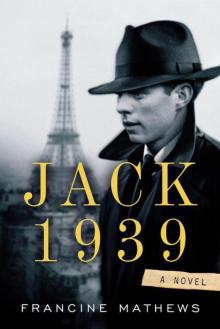 Jack 1939
Jack 1939 Death in a Cold Hard Light
Death in a Cold Hard Light Blown
Blown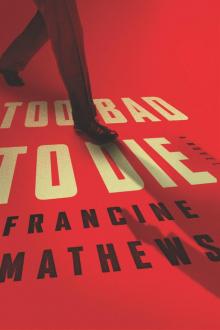 Too Bad to Die
Too Bad to Die